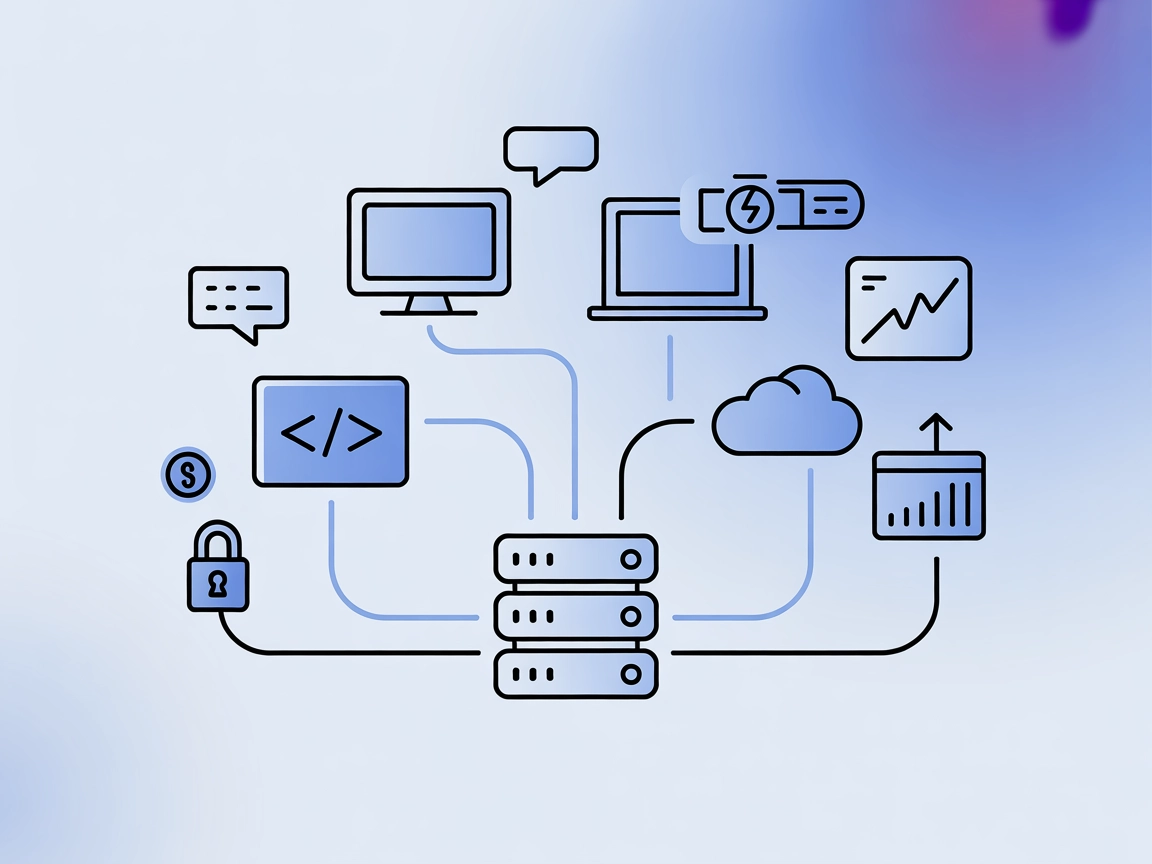
Quarkus MCP Server
The Quarkus MCP Server enables FlowHunt users to connect LLM-powered agents to external databases and services via Java-based MCP servers, streamlining automati...

Integrate the Qwen Max language model into your workflows with this stable, scalable MCP server built on Node.js/TypeScript for Claude Desktop and more.
FlowHunt provides an additional security layer between your internal systems and AI tools, giving you granular control over which tools are accessible from your MCP servers. MCP servers hosted in our infrastructure can be seamlessly integrated with FlowHunt's chatbot as well as popular AI platforms like ChatGPT, Claude, and various AI editors.
The Qwen Max MCP Server is an implementation of the Model Context Protocol (MCP) designed to connect the Qwen Max language model with external clients, such as AI assistants and development tools. By acting as a bridge, the server enables seamless integration of the Qwen series models into workflows that require advanced language understanding and generation. It enhances development by enabling tasks like large-context inference, multi-step reasoning, and complex prompt interactions. Built on Node.js/TypeScript for maximal stability and compatibility, the server is particularly suitable for use with Claude Desktop and supports secure, scalable deployments. With support for several Qwen model variants, it optimizes for both performance and cost, making it a versatile solution for projects requiring robust language model capabilities.
No explicit prompt templates are mentioned or described in the repository.
No explicit MCP resource primitives are documented in the repository.
No explicit tools or “server.py” (or equivalent file listing executable tools) are present or described in the repository.
npx -y @smithery/cli install @66julienmartin/mcp-server-qwen_max --client windsurf
{
"mcpServers": [
{
"command": "npx",
"args": ["@66julienmartin/mcp-server-qwen_max", "start"]
}
]
}
{
"env": {
"DASHSCOPE_API_KEY": "<your_api_key>"
}
}
npx -y @smithery/cli install @66julienmartin/mcp-server-qwen_max --client claude
{
"mcpServers": [
{
"command": "npx",
"args": ["@66julienmartin/mcp-server-qwen_max", "start"]
}
]
}
{
"env": {
"DASHSCOPE_API_KEY": "<your_api_key>"
}
}
npx -y @smithery/cli install @66julienmartin/mcp-server-qwen_max --client cursor
{
"mcpServers": [
{
"command": "npx",
"args": ["@66julienmartin/mcp-server-qwen_max", "start"]
}
]
}
{
"env": {
"DASHSCOPE_API_KEY": "<your_api_key>"
}
}
npx -y @smithery/cli install @66julienmartin/mcp-server-qwen_max --client cline
{
"mcpServers": [
{
"command": "npx",
"args": ["@66julienmartin/mcp-server-qwen_max", "start"]
}
]
}
{
"env": {
"DASHSCOPE_API_KEY": "<your_api_key>"
}
}
Using MCP in FlowHunt
To integrate MCP servers into your FlowHunt workflow, start by adding the MCP component to your flow and connecting it to your AI agent:

Click on the MCP component to open the configuration panel. In the system MCP configuration section, insert your MCP server details using this JSON format:
{
"qwen-max": {
"transport": "streamable_http",
"url": "https://yourmcpserver.example/pathtothemcp/url"
}
}
Once configured, the AI agent is now able to use this MCP as a tool with access to all its functions and capabilities. Remember to change “qwen-max” to whatever the actual name of your MCP server is (e.g., “github-mcp”, “weather-api”, etc.) and replace the URL with your own MCP server URL.
| Section | Availability | Details/Notes |
|---|---|---|
| Overview | ✅ | Full overview and model info provided |
| List of Prompts | ⛔ | No prompt templates documented |
| List of Resources | ⛔ | No explicit MCP resource primitives found |
| List of Tools | ⛔ | No tools explicitly listed |
| Securing API Keys | ✅ | Environment variable usage in setup documented |
| Sampling Support (less important in evaluation) | ⛔ | Not mentioned |
Based on the information provided, the Qwen Max MCP Server is well-documented for installation and model details but lacks explicit documentation or implementation of MCP resources, tools, or prompt templates in the public repository. This limits its extensibility and out-of-the-box utility for advanced MCP features.
We would rate this MCP server a 5/10. While its installation and model support are clear and the project is open source with a permissive license, the lack of documented tools, resources, and prompt templates reduces its immediate value for workflows that depend on MCP’s full capabilities.
| Has a LICENSE | ✅ |
|---|---|
| Has at least one tool | ⛔ |
| Number of Forks | 6 |
| Number of Stars | 19 |
The Qwen Max MCP Server is a Model Context Protocol (MCP) server that connects Qwen Max and related language models to external clients and development tools. It enables large-context inference, multi-step reasoning, and makes Qwen models accessible via a unified interface.
It powers large-context chat and inference (up to 32,768 tokens), model experimentation, seamless integration with Claude Desktop, API-based access for building assistants or automation, and token cost management for deployments.
No, the current public repository does not document any explicit prompt templates, MCP resource primitives, or executable tools for this server.
Store your DASHSCOPE_API_KEY in environment variables as shown in the setup instructions for each client. This keeps sensitive keys out of your source code and configuration files.
Yes, the server is open source with a permissive license, making it suitable for both experimentation and production use.
It is well-documented for installation and model integration, but lacks immediate support for tools, resources, or prompt templates, resulting in an overall score of 5/10.
Unlock large-context AI capabilities and seamless integration with Qwen Max MCP Server. Start building with advanced language models now.

The Quarkus MCP Server enables FlowHunt users to connect LLM-powered agents to external databases and services via Java-based MCP servers, streamlining automati...

The ModelContextProtocol (MCP) Server acts as a bridge between AI agents and external data sources, APIs, and services, enabling FlowHunt users to build context...

The QGIS MCP Server bridges QGIS Desktop with LLMs for AI-driven automation—enabling project, layer, and algorithm control, as well as Python code execution dir...
Cookie Consent
We use cookies to enhance your browsing experience and analyze our traffic. See our privacy policy.